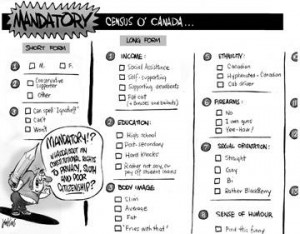The text below, sent by the Chief Statistician to all employees of Statistics Canada is a very interesting development.
La version française suit.
2011 Census: Meeting the challenge
On June 26, 2010, the questionnaire for the 2011 Census was published in the Canada Gazette as required by the Statistics Act. The census will consist of the same eight questions that appeared on the 2006 Census short-form questionnaire. The information previously collected by the mandatory long-form questionnaire will now be collected as part of the new voluntary National Household Survey.
Since the announcement, this new format has received widespread coverage in the news media.
I am aware that this situation has generated questions. Given this, I have decided to hold a town hall on Wednesday, July 21, 2010 in the Simon A. Goldberg Conference Room from 2 p.m. to 3 p.m (Ottawa time).
In order to ensure I address those issues of most concern, I ask that you submit your questions via e-mail to Chief Statistician/Statisticien en chef before 12 p.m. on Tuesday, July 20 (Ottawa time).
Because of the limited capacity of the conference room, the meeting will be broadcast live on the ICN. An e-mail with the link to the broadcast will be sent to all employees before the meeting. Simultaneous translation and sign interpretation will be provided.
———————————
Recensement de 2011 : relever le défi
Le 26 juin 2010, le questionnaire du Recensement de 2011 a été publié dans la Gazette du Canada, conformément à la Loi sur la statistique. Le recensement sera constitué des mêmes huit questions qui ont figuré dans le questionnaire abrégé du Recensement de 2006. Les données antérieurement recueillies au moyen du questionnaire détaillé seront recueillies sur une base volontaire dans le cadre de la nouvelle Enquête nationale auprès des ménages.
Depuis son annonce, ce nouveau format a reçu une couverture médiatique très importante.
Je suis conscient que la situation a soulevé des questions. Par conséquent, j’ai décidé de tenir une séance de discussion ouverte le mercredi 21 juillet 2010 au Centre de conférences Simon-A.-Goldberg de 14 h à 15 h (heure d’Ottawa).
Afin de bien cerner les enjeux les plus préoccupants, je vous demande de me faire parvenir vos questions à l’adresse Statisticien en chef/Chief Statistician d’ici le mardi 20 juillet à 12 h (heure d’Ottawa).
En raison de la capacité d’accueil limitée de la salle, la réunion sera diffusée sur intranet en temps réel. Un courriel contenant le lien vers le RCI sera envoyé à tous les employés avant l’événement. La traduction simultanée et l’interprétation gestuelle seront offertes.



Comments on Posts